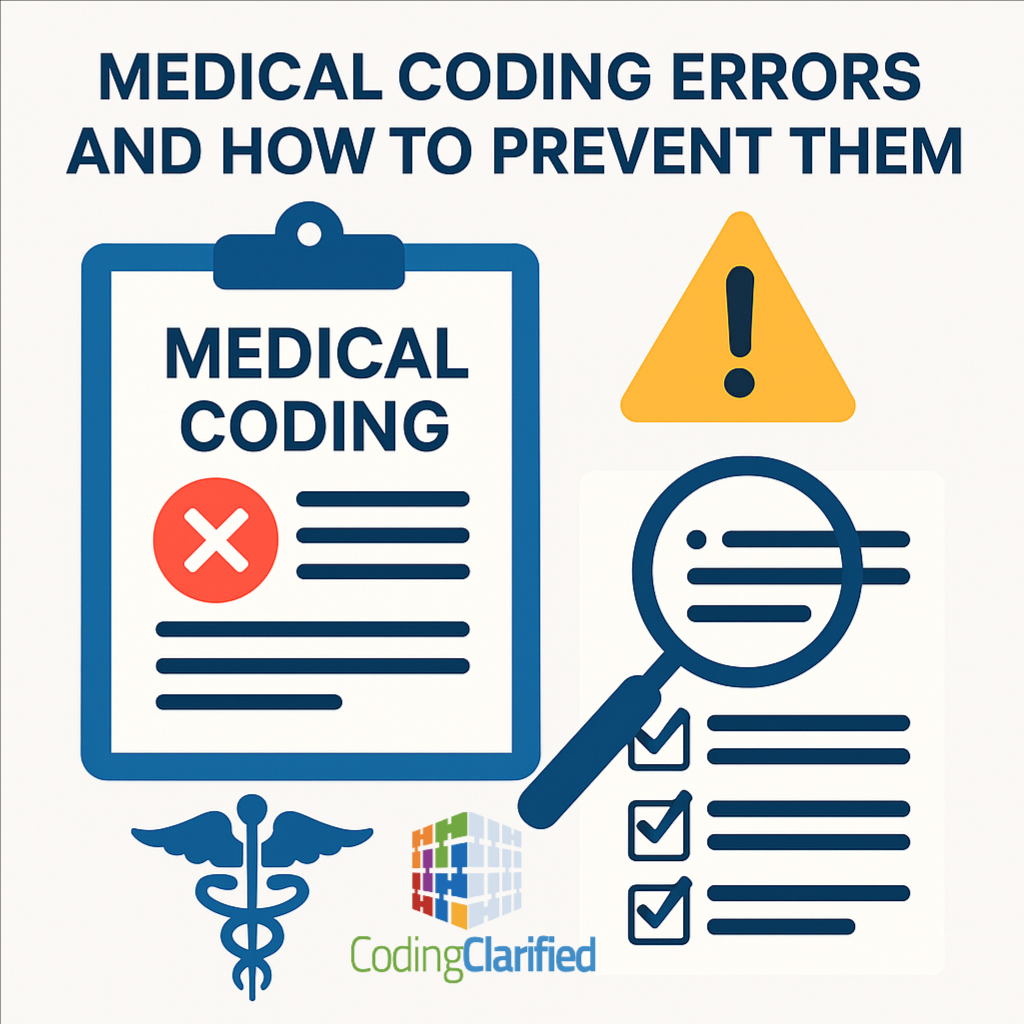Accurate medical coding is essential for ensuring proper reimbursement, maintaining compliance, and supporting patient care documentation. Even small errors can result in claim denials, compliance issues, or financial losses for healthcare providers. Understanding the common causes of medical coding errors—and how to prevent them—helps coders maintain high standards of accuracy and integrity in their work.
Common Types of Medical Coding Errors
-
Incorrect Code Selection
Choosing the wrong CPT®, HCPCS, or ICD-10-CM code is one of the most frequent mistakes. This often happens when coders misinterpret documentation or select codes that are “close” but not exact matches. -
Upcoding and Downcoding
-
Upcoding occurs when a higher-level service is reported than was actually provided.
-
Downcoding happens when a lower-level service is selected, resulting in lost revenue.
Both can trigger audits and compliance concerns. Medical Coding Bundling and Upcoding
-
-
Omitting Codes or Modifiers
Missing diagnosis codes, procedure codes, or appropriate modifiers (like 25, 59, or 91) can lead to claim denials or incorrect reimbursement. CPT Medical Modifiers -
Unbundling Services
Reporting individual components of a bundled service separately violates payer guidelines and can be flagged during audits. -
Insufficient or Incomplete Documentation
Even if coding is accurate, incomplete documentation from providers can make it impossible to justify the codes submitted. -
Failure to Stay Updated
Coding guidelines, payer rules, and annual code set changes (ICD-10, CPT®, and HCPCS) evolve yearly. Using outdated information can cause major compliance issues. Medical Coding Mistakes That Could Cost You
Consequences of Coding Errors
-
Claim denials and delays
-
Overpayments that require refund
-
Compliance audits and penalties
-
Loss of payer trust
-
Negative impact on facility performance metrics
Strategies to Prevent Medical Coding Errors
-
Thorough Documentation Review
Coders should always verify that the provider’s documentation supports every code reported. Clarify discrepancies with providers when needed. -
Regular Coding Audits
Conduct internal or external audits to identify recurring issues. Audit findings can guide training and improve accuracy. -
Ongoing Education and Certification Maintenance
Participate in workshops, webinars, and continuing education to stay updated on coding changes, payer rules, and compliance regulations. -
Use Coding Software and Encoder Tools
Reliable encoders, claim scrubbers, and EHR tools can help flag possible errors and prompt coders to review potential issues. -
Stay Current on Payer Guidelines
Each payer may have specific rules for modifiers, bundling, and medical necessity. Staying informed prevents unnecessary denials. -
Promote Communication Between Coders and Providers
Establish a feedback loop where coders can request clarification and providers understand how documentation impacts billing and compliance. -
Double-Check Before Submission
A final review step—by a second coder or through automated validation—can catch small mistakes before claims are sent.
The Importance of Accuracy in Medical Coding
Accurate coding is more than just billing—it ensures fair reimbursement, compliance, and accurate data for healthcare analytics and public health. Coders play a vital role in maintaining the financial and operational integrity of healthcare organizations. Preventing errors requires continuous education, attention to detail, and collaboration within the healthcare team.
In short: Preventing medical coding errors means prioritizing accuracy, compliance, and continuous learning. Coders who follow best practices and stay up to date with industry standards protect both their organizations and their professional credibility.

